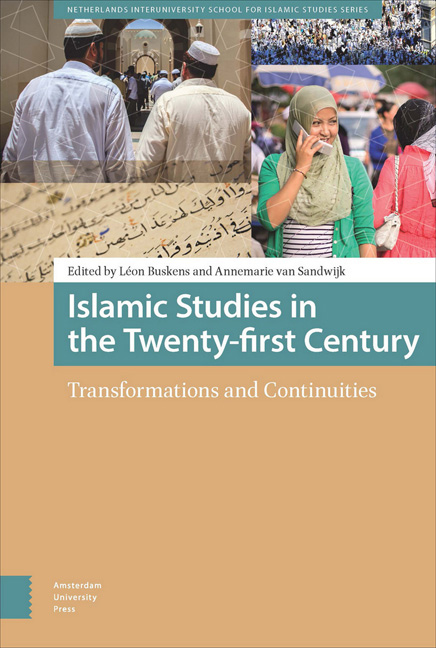Book contents
- Frontmatter
- Dedication
- Contents
- Preface
- Introduction: Dichotomies, Transformations, and Continuities in the Study of Islam
- Islamic Texts: The Anthropologist as Reader
- Textual Aspects of Religious Authority in Premodern Islam
- What to Do with Ritual Texts: Islamic Fiqh Texts and the Study of Islamic Ritual
- Textual Study of Gender
- Scholarship on Gender Politics in the Muslim World: Some Critical Reflections
- Power, Orthodoxy, and Salvation in Classical Islamic Theology
- Dialectical Theology in the Search for Modern Islam
- “Classical” Islamic Legal Theory as Ideology: Nasr Abu Zayd’s Study of al-Shafiʿi’s al-Risala
- Islamic Law in the Modern World: States, Laws, and Constitutions
- Vernacular Cosmopolitanism as an Ethical Disposition: Sufi Networks, Hospitality, and Translocal Inclusivity
- Middle Eastern Studies and Islam: Oscillations and Tensions in an Old Relationship
- Notes on Contributors
- Overview of NISIS Autumn Schools, 2010-2014
- Index
Vernacular Cosmopolitanism as an Ethical Disposition: Sufi Networks, Hospitality, and Translocal Inclusivity
Published online by Cambridge University Press: 12 December 2020
- Frontmatter
- Dedication
- Contents
- Preface
- Introduction: Dichotomies, Transformations, and Continuities in the Study of Islam
- Islamic Texts: The Anthropologist as Reader
- Textual Aspects of Religious Authority in Premodern Islam
- What to Do with Ritual Texts: Islamic Fiqh Texts and the Study of Islamic Ritual
- Textual Study of Gender
- Scholarship on Gender Politics in the Muslim World: Some Critical Reflections
- Power, Orthodoxy, and Salvation in Classical Islamic Theology
- Dialectical Theology in the Search for Modern Islam
- “Classical” Islamic Legal Theory as Ideology: Nasr Abu Zayd’s Study of al-Shafiʿi’s al-Risala
- Islamic Law in the Modern World: States, Laws, and Constitutions
- Vernacular Cosmopolitanism as an Ethical Disposition: Sufi Networks, Hospitality, and Translocal Inclusivity
- Middle Eastern Studies and Islam: Oscillations and Tensions in an Old Relationship
- Notes on Contributors
- Overview of NISIS Autumn Schools, 2010-2014
- Index
Summary
Introduction
In Regulating Aversion, the philosopher Wendy Brown makes the point that “[t]olerance as a political practice is always conferred by the dominant, it is always a certain expression of domination even as it offers protection or incorporation to the less powerful” (Brown 2008, 178). Those who are perceived to be intolerant are defined by tolerant Westerners as barbarians, she proposes, and as such a legitimate target of aggression. The result is that tolerance, in marking what is “civilised,” confers superiority on the West, even in such cases when Western liberals concede that “the other” too may be “tolerant.” The discursive act of labelling establishes the relationship of dominance (see Brown 2008, 176-258).
If we accept Brown's position, this creates a dilemma for students of Islamic societies, similar to dilemmas raised in the past by the questioning of ethnographic authority in anthropological writing. If cosmopolitanism is defined at least in part by an ethics of tolerance or “openness,” a willingness to reach out to a cultural “other” or stranger, may we conclude, with Brown, that cosmopolitanism is necessarily Western, secular-liberal, and elitist – a discursive strategy that disguises and depoliticises relations of dominance? And, if so, what room is there for ethnographers of Muslim societies to attempt to describe their research subjects as “cosmopolitan,” or to theorise a non-elitist, demotic, vernacular cosmopolitanism that is nevertheless tolerant, moral, and ethical? Can it be that the people anthropologists study beyond the West, including Muslims, are incapable of being “truly” cosmopolitan in their own right?
Against Brown's view, I want to propose here that non-Western societies may be equally tolerant and cosmopolitan in their own, locally and culturally embedded, vernacular cosmopolitan ways. By vernacular cosmopolitanism I refer here to alternative, particularly non-Western, forms of cosmopolitan ethics, defined broadly as an openness to difference, whether to other ethnic groups, cultures, religions, or nations. One path towards recovering the cosmopolitanism of societies beyond the West, I suggest, is to make more explicit the indigenous, vernacular terms used by them to express their cosmopolitan ethical outlook or ideology.
Against the notion of a Muslim cosmopolitanism, Muslims are often defined by the media and politicians as narrow, intolerant, repressive, and unwilling to recognise and respect non-Muslims; in other words, as anti- or counter-cosmopolitan. But is this really so?
- Type
- Chapter
- Information
- Islamic Studies in the Twenty-first CenturyTransformations and Continuities, pp. 223 - 240Publisher: Amsterdam University PressPrint publication year: 2017



